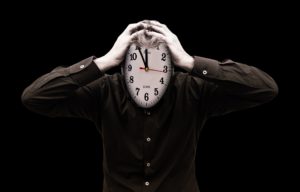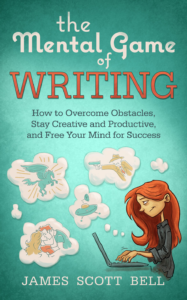Writerly burnout. I never thought it would happen to me, until it did.
In 2016, I produced the first two novels in my Empowered series as well as a prequel novella to that series, with the novels scheduled for publication the following year. In 2017, I produced two novels, including the third Empowered and a space opera novel, publishing those as well that year. In the first half of 2018, I produced a novel and a novelette.
Not an unreasonable pace. But the whole time I was stressing about not writing fast enough.
By mid-2018 I’d published five novels since January 2017, along with the novella and the novelette, and was working on what was supposed to be Book 1 in my next series, which I published in September 2019. However, I had started out in back January 2016 determined to produce four novels a year. After all, I knew indie authors writing at that pace, or even faster. Why couldn’t I? The result was lots of self-induced stress which eventually led to my burning out.
I didn’t stop completely, but I struggled to write the second novel in my second series and eventually trunked it. I did write the fifth and final Empowered novel during the first half of 2020, and then, that fall, moved to working on my first mystery novel. That ended up being a learning process which took two and a half years, with A Shush Before Dying releasing in April 2023. The second novel, Book Drop Dead, was published in June 2024. I’m now in the middle of writing the third book in my 1980s library cozy mystery series, and more mindful than ever of my own individual process and speed as a writer, especially given that mysteries are more challenging to write than my fantasy novels.
So, I did recover from my own burnout. A big help was advice here from our own JSB and other TKZ posters, especially on managing expectations, getting rest, and focusing on my own process and path rather than comparing my writing career to others.
As it so happens, this evening I’m on a panel about dealing with burnout, taking place as part of Orycon, our local science fiction convention. Tonight’s upcoming panel inspired me to dip into the archives for today’s Words of Wisdom.
We have an excerpt from James Scott Bell on finding a steady pace to avoid writerly burnout, and another by Joe Hartlaub on getting past writerly and readerly burnout. As always, links to each post are provided at the end of their respective excerpts.

The pressure comes when the writer who wants to make good dough at this thing (even a living) realizes that the only “formula” (and lottery-type luck is not a formula) is to keep producing quality work at a steady pace.
Notice that word, steady. I believe this is the key to avoiding writer burnout. Every writer has a sweet spot where production meets life and stays on its side of the fence. We call this a quota.
Now, those of you who’ve read my craft pieces over the years know I’m a quota guy. It’s the single most important discipline in my own writing life. I started down this road in 1988, and early on I remember reading about how important a quota was. The very first writing craft book I ever purchased was Lawrence Block’s Writing the Novel. In it, he has a section on quotas, and notes that most pro writers keep track of the words they produce, not the time they spend at the desk.
That got to me, and I have stuck to a quota ever since. It’s almost always been 1,000 words a day, six days a week, with a day of rest on Sunday.
Though I have cheated on occasion when a deadline was breathing down my neck, this “writing Sabbath” has been crucial for me. It gives my brain much-needed rest. I find I’m always energized to start up again on Monday. That is perhaps the main reason I’ve never truly felt burned out. Tired, yes. But the big fizzle, no.
It’s also important, I’ve found, to take daily breaks. I’m usually not more than an hour at a time at the keyboard. I’ll then take a five- or ten-minute stretch or stroll. In the afternoon I take a power nap—15 to 20 minutes.
One other thing I have to do is keep myself from “over-writing” when the going is good. Block addresses this in his book:
One thing you might try to avoid, in this connection, is attempting to extend your productivity. This sort of overload principle works fine in weightlifting, where one’s ability to manage more weight increases as one lifts more weight, but it doesn’t work that way in writing. It’s tempting to try to do a little more each day than we did the day before, and I still find myself intermittently struggling to resist this particular temptation, even after lo these many years. If I can do five pages today, why can’t I do six tomorrow? And seven the day after? For that matter, if I really catch fire and do seven today, that proves I can definitely do a minimum of seven tomorrow. Doesn’t it?
No, it doesn’t.
What does happen, in point of fact, is that this sort of overload generally leads to exhaustion … Find your right pace, make sure it’s one that’s not going to be a strain, and then stick with it.
And sometimes writing breaks are thrust upon us.
Like getting sick. I thank the Good Lord I’m pretty healthy most of the time, but last year I got taken out by a bout of pneumonia. It actually set me back a couple of weeks. I managed some writing, but mostly I rested and took my antibiotics and sniped at my wife (this saint continued to take care of me.)
I’ve also found that when I go to a convention, like Bouchercon or ThrillerFest, it’s almost impossible for me to get in any writing time. There’s too much going on, like Gilstrap holding court in the bar with his Beefeater martini. No one wants to miss that. So I give myself permish to take several days off when I attend. (I also find I can write on a plane going to a location, but not coming home. I think that has to do with my being a morning person, as I described a couple of weeks ago.
Yes, there is one exception to all this steadiness, and that’s NaNoWriMo. We need not revisit the debate over this singular month of writing madness (you can search for NaNoWriMo in our archives for that), but it’s there for you to consider.
What I’m saying is simply this: be as intentional about taking a break from writing as you are about producing the words. Be strategic, be smart. I’ve said this many times before, but here it is again: figure out how many words you can easily write in a daily session. Now up that by 10%. So if it’s 250 words, you aim for 275. 1000 = 1100. Try to do that six days a week.
But do not beat yourself up if circumstances conspire against you. Treat every new week afresh.
Do this day after week after year—with regular breaks—and you will not only avoid the B-word, you’ll see an amazing output of material. Which is the difference between someone who wants to write and a writer.
James Scott Bell—February 4, 2018
I’ve been repeatedly having the same vaguely disturbing conversation in person and via email with a number of individuals recently about books and reading. The topic is variously referred to as “reading fatigue,” “book burnout,” and “reading slump,” among other terms. The complaint centers upon the perceived feeling that new books being published are “all” following the same pattern. Elements of that pattern would include 1) “the placement of the word ‘girl’ in the title; 2) the unreliable first-person narrator; and 3) a missing child/husband/sister who seems to suddenly reappear with an inability to explain their absence.
It is true that publishing industry generally is reactive and not proactive. We all remember The Da Vinci Code. That book became a sub-genre unto itself. It seemed for a while as if every other newly published book concerned a hunt for an ancient relic that, depending on what it was and who was hunting it, would destroy, save, or enslave the world. Going back a bit further, Scott Turow’s Presumed Innocent and John Grisham’s The Firm revived the popularity of the courtroom thriller, though it’s not as if that sub-genre ever really went away, once Erle Stanley Gardner had taken that beachhead in the 1930s with his Perry Mason novels.
There is some method to publishing’s madness, based on the proposition that if the public likes a certain type of book then it will want more of the same. I don’t recall a research ever calling me and asking, “If you went to the library tomorrow, what type of book would you look for?” My answer would be “bound,” but that’s beside the point.
What does this mean for budding authors? My best advice is to not follow trends. If someone writes a book about an alcoholic housewife on a train who suspects that she has witnessed a murder being committed, and it becomes a bestseller, write your book about something else. Flip the script. Write about a recovering alcoholic who is as reliable as a Fossil Haywood and who, while doing some backyard gardening, believes that she sees someone being murdered on the LIRR. I’m only kind of kidding. Do something different, because by the time you write your book and find an agent the publishers will probably be looking for something else. As for readers: if you’re tired of new books, look for an author who is new to you, or go back to the past and seek out something in your favorite genre among the mountains of books that have been published in the past sixty years or so. You can also seek out a couple of go-to authors. When I do my own reading, and nothing seems to please me, I pick up one of Timothy Hallinan’s fine novels, or an Elmore Leonard book, or start working my way through James Lee Burke’s Dave Robicheaux canon, among others, to shake me out of my doldrums. Reading is good for you. You don’t want to stop.
Joe Hartlaub—November 4, 2017
***
Along with JSB’s and others advice, two books which helped me in dealing with burnout are Breakthrough by J. Dharma Kelleher and Dear Writer, Are You In Burnout?, by Becca Syme, as well as Becca’s YouTube series on burnout on her Quitcast channel there. To supplement Joe’s excellent advice on dealing with reading burnout I recommend checking with your local librarian for advice. Librarian’s love giving “reader’s advisory” and helping reader’s find their next great read.
The panel I’m on tonight, “Thinking Through Burnout,” asks several questions in the description that can serve as a jumping off point to our discussion today:
“Thinking is hard when you’re tired all the time. How do you manage burnout when it hits in the middle of a list of critical tasks? What coping mechanisms have worked for you, or not? Do you have tools or strategies to prevent burnout?”
In addition to that, have you ever suffered from reader burnout as described by Joe? If so, how did you get past it and reconnect with your love of reading?


